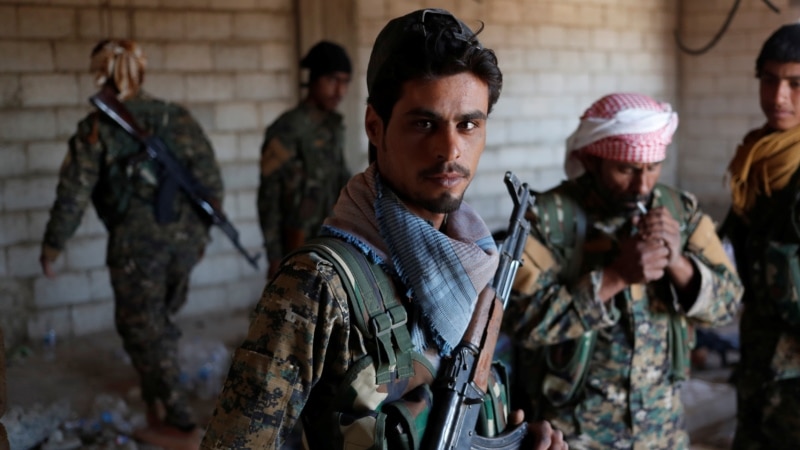Arab-Kurdish Feud Deepens as Fears Mount Over Battle for Raqqa

Syrian rebel militias and Turkey appear to be preparing to intensify their military operations north of Aleppo aimed at taking back mainly Arab towns and villages the Kurdish People’s Protection Units, or YPG, seized in 2015.
The fighting is a new sign that the United States Turkey, Russia and Iran are plunging deeper into a multifaceted conflict that's carved Syria into unstable zones of influence with no clear lines emerging of how piece it back together.
The Syrian Kurdish force is the United States' main ally in northern Syria. More Arab-on-Kurd clashes would complicate plans for the Kurdish-led Syrian Democratic Forces to assault Raqqa, the Islamic State terror group’s self-styled capital.
The situation in northern Syria is becoming more complex by the day, with patchwork micro-conflicts featuring a variety of rival militias, as fighting intensifies between Turkish-backed Arab rebels and Kurds.IS has tried to gain a foothold in Idlib province to the west of Aleppo, bringing it into confrontation with rival al-Qaida jihadists.
All the feuding groups are vying for territory.
Fighting in northern Syria between rebels backed by Turkey, a NATO member, and the Kurds risks undermining the battle against IS.
Arabs and Kurds
The Syrian Observatory for Human Rights, a London-based network of activists in Syria, warns there are “continued preparations by Turkish forces and the factions backed by them" to launch an operation to regain control of areas they lost in late 2015 and early 2016.
Rebels who’ve been battling the regime of President Bashar al-Assad for years are still smarting from what they see as a Kurdish land-grab of mainly Arab towns north of Aleppo under cover of, and apparently coordinated with, a Syrian government offensive in December 2015.In some towns the YPG seized, only about 10 percent of the Arab residents who fled have been allowed to return, the rest are housed in camps along the Turkish-Syrian border.
This week, Turkish-backed Arab militias clashed with SDF units north of Aleppo despite efforts by Russia and the United States to prevent the conflict.
The Turks and Arab rebel militias Ankara backs fear the Kurds want to link up Kurdish cantons along the border with Turkey. The Kurds have made no secret of their determination to establish a self-governing entity in northern Syria.
Analysts say Arab skirmishing with Kurds, and Turkish shelling of YPG positions around the Kurdish enclave of Afrin, are forcing the SDF to reduce the forces it could use in the assault on Raqqa.That provides IS with a clear opening to exploit and there are signs the assault on Raqqa is being affected.
“The U.S.-backed Syrian Democratic Forces appear to be struggling in the campaign for Raqqa, with reliable reports suggesting several hard fought for front-lines were relinquished over the weekend due to heavy IS pressure,†says Middle East Institute analyst Charles Lister.
Meanwhile, leaders of the Syrian Coalition, the main umbrella organization of the anti-Assad insurgents, warn of a possible fight between Arabs and Kurds over control of Raqqa after IS has been evicted.Syrian rebels are demanding Raqqa be administered by local residents, not a council shaped by the YPG.
A 'gift' for IS
Speaking with political activists during a teleconference, the president of the Syrian Coalition, Riad Seif, stressed his his position that the Kurds should not participate in Raqqa’s governance.He said the SDF, which is commanded largely by YPG officers, should withdraw from the city once it’s cleared of Islamic extremists.
Disputes over the territory freed from IS in Syria and Iraq are gifts for the group, says Mideast analyst Lister.He says the extremists will “adapt to the new security environ by conducting geographically disparate attacks, exploiting seams between anti-IS forces, and setting conditions to resurge in alternative terrain.â€
Turkey has not reduced its vehement opposition to U.S. support of the YPG, a militia it views as the Syrian affiliate of the Kurdistan Workers Party, a separatist Turkish Kurd group the U.S., European Union and Ankara all consider terrorists.
Monday, Turkey’s National Security Council accused the United States of allowing weapons it provided to the YPG to be passed on to the PKK.“This shows that both are the same organization,†the council said.
The Turks offered no specifics to support their allegation.But a spokesman for U.S. Central Command, which oversees American military operations in Syria and Iraq, told VOA the weapons the United States has supplied the SDF "will be returned to the coalition on completion of the mission.â€
In further evidence of Turkish anger, the state-run Anadolu news agency published the locations of nearly a dozen U.S. military bases across a 200-kilometer stretch of northern Syria.The bases listed by Anadolu are where American military advisers and Special Forces oversee the assault on Raqqa.

0 Response to "Arab-Kurdish Feud Deepens as Fears Mount Over Battle for Raqqa"
Posting Komentar